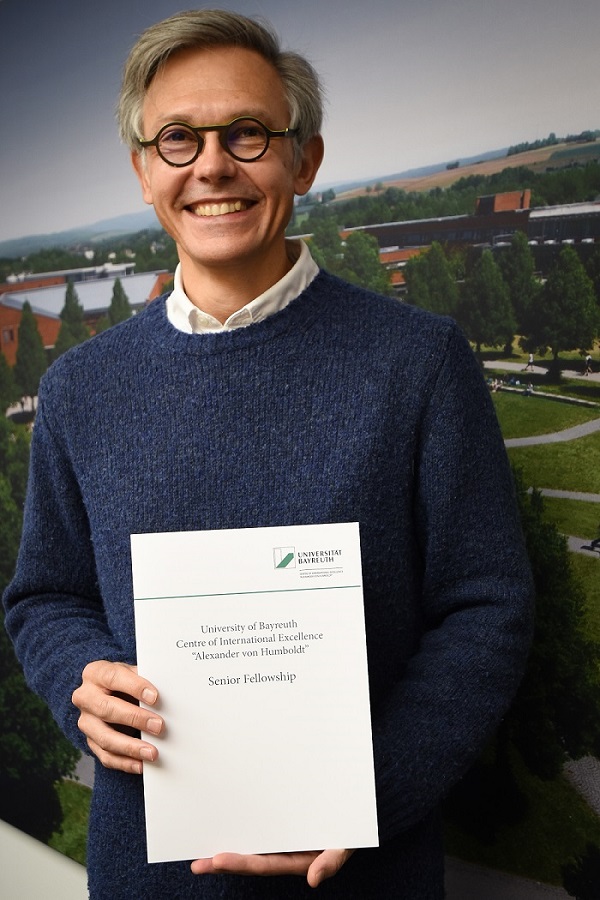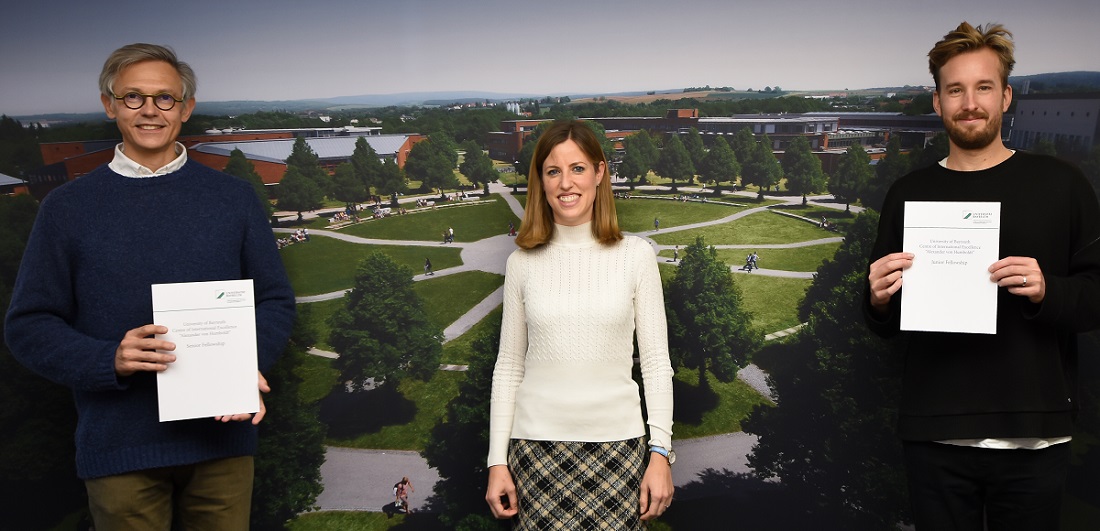Meet the Fellow: Stephanus Muller
How is South African art music (not) African art music?
Professor Stephanus Muller came from South Africa to investigate the different perspectives on African musical modernity – and to enjoy running through the Bayreuth forests! Building on an existing collaboration with his host, Dr. Lena van der Hoven (musicology), he could also benefit from the unique musical sources of the archive of the Iwalewahaus.

What are the foci of your joint research funded by the Fellowship?
Stephanus Muller: Both Dr van der Hoven and I are interested in questions of definition, and demarcation. 'Africa', as applied to 'African art music' (my area of research) and 'African opera', is much richer than a geographical designation. 'Africa', in this sense, expresses aspirations, resistances, locutions and locations. Our joint interest is in interrogating these. Part of our work is about listening how musicians and audiences think of what it is they are doing when they are performing or listening to music variously described as 'African art music' or 'African opera'. But part of it is also performing primary, archival research that maps basic historical narratives. And yet another part has to do with critically looking at music scores, and assessing performances. The discourses and musical practices we are interested in also provide various options to consider decolonial strategies in the performing arts. Decoloniality, therefore, also provides an overlapping theoretical aspect to our joint interests.
In what way is your work interdisciplinary, and what does interdisciplinarity mean to you in academic work and life?
I head up an interdisiplinary, music-based institute at Stellenbosch University in South Africa: the Africa Open Institute for Music, Research and Innovation. At AOI we approach interdisciplinarity as a powerful decolonial strategy. Much of what defined apartheid-era scholarship in the humanities could be described with the word 'containment'. Anything could (and arguably was) 'contained', but nothing more than the risks of transgressing boundaries (between groups, geographies, 'races', categories of all kinds). The interdisciplinary impulse of AOI has to be one of transgression. We transgress the boundaries between disciplines and arts, between various approaches to scholarship and artistic practices, between what is considered scholarship and what isn't, to what is considered art and isn't. It is an ethos of risk-taking and radical aesthetics and intellection, made more so by the extreme marginality of our interests in the broader contexts of our work, also in the university.
What is in your opinion the future of your field / in what way can research in your field contribute to meeting the urgent challenges of our time?
South Africa has been devastated by apartheid, by systemic corruption in state and private sectors, and by the general failure to propose some working model of a structure to replace the notion of 'society', which has become defunct. Intellectuals and artists have a very particular role to play in such circumstances. The question is not only how to imagine forms of co-existence and individuation, but to stage, articulate, and curate these future structures in self-conscious ways that clarify alternative options. Art - and some registers of the academic enterprise - allow us to consider the states we are in (collectively and individually) through its awareness of itself as constructed experience, or reality installation. This ranks right up there with the urgent challenges of our time. The future of arts-based research at universities is very different, I believe, in the Global North and the Global South. In the latter, where I work, it risks being cancelled - I choose that word deliberately - through crises threatening basic conditions of existence.

Fellows Stephanus Muller und Justin Begley with Susanne Lopez Enriquez, Managing Director of the Bayreuth Humboldt Centre
What does international research mobility mean to you?
Of course, there are the usual things: A chance to regain and adjust perspectives, discovering new things, meeting people and experiencing different atmospheres. Things, to be sure, that I have always felt to be enriching and beneficial to my work. But part of travelling is also to luxuriate in the ability to do so, and Covid has made explicit how much we have started taken this for granted. As a South African, I am challenged by patterns of mobility: Value extraction (outflow), nurturing conditions of sustainable intellectual and artistic contexts (steady state shimmerings of movement), investments (inflow), and how research mobility forms a part of the vast inequalities that exist in the knowledge economies that we inhabit. I live in a country where mobility - research or otherwise - is restricted for a vast majority of people by poverty and danger to life and limb. In this context, international research mobility is not only a privilege, but a responsibility.
How did the current challenges influence your cooperation?
Clearly restrictions on movement, and gathering - academic and social - change how one conducts research, how one experiences academic environments and what kinds of affective attachments one makes to places and people. Unlike much scientific work, my research is not conducted in team contexts. With electronic connectivity being what it now is, networking and collaborative work can continue, albeit in different ways than before. But what is very different, is the sense of demotivation and also demoralisation that results from the restrictedness of human contact in our daily lives, also in research environments. It is tangible, and registers a loss that is difficult to articulate. I sense, although this might be a projection, a dissipation of energy, and an extended sense of vulnerability that manifests in a heightened awareness of the potential danger to self of others, and of the air we inhale. We have become conscious of the precarity of breathing on a truly global scale, and the fragility of our breathing apparatus.
The Fellow:
Stephanus Muller is Professor of Music and Director of the Africa Open Institute for Music, Research and Innovation at Stellenbosch University, South Africa. He is the publisher of an online digital arts initiative, herri.org.za. His most recent book, co-edited with Stephanie Vos, is the published and annotated correspondence between composer Arnold van Wyk and conductor Anton Hartman, Sulke vriende is skaars: Die briewe van Arnold van Wyk en Anton Hartman 1949-1981 (Protea, 2020).
